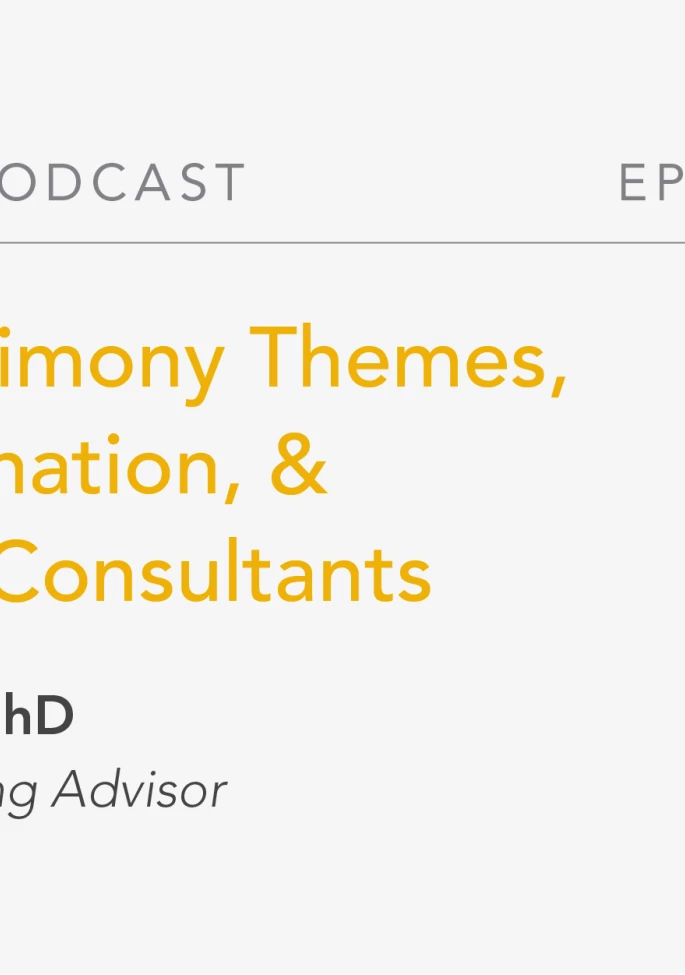IMS Senior Jury Consulting Advisor Dr. Merrie Jo Pitera joins podcast host and IMS Client Services Advisor Adam Bloomberg to discuss the goals of witness preparation, what makes a witness credible, and how witnesses can testify so jurors will understand. Listen, watch, and/or read the transcript below. (Part 1 of 2. See Part 2 here.)
Hello, and welcome to the IMS Insights Podcast. I’m your host, Adam Bloomberg. Today, we’re speaking with IMS Senior Jury Consulting Advisor Dr. Merrie Jo Pitera about the witness preparation process, factors affecting witness credibility, and how to increase comprehension based on juror psychology.
Dr. Pitera is a psychology and communication expert with more than 30 years of consulting experience in complex litigation. In addition to being a jury consultant, Merrie Jo has prepared hundreds of witnesses for depositions, trials, arbitration, and congressional hearings. She is a frequent national and international speaker on juror behavior and witness preparation methods.
Adam Bloomberg:
Thank you for joining us today, Merrie Jo. So, you're a psychology and communications expert specializing in complex litigation and trial consulting. For more than 30, 30, 30 years of experience in the field?
Merrie Jo Pitera:
Yes, a little over 30.
Adam Bloomberg:
Okay. You’ve managed hundreds of cases, and you really understand what's at stake. How did you first become involved in jury consulting, and why choose this career?
Merrie Jo Pitera:
Well, in my undergrad program at Clemson University, I was in the psychology program, and I met Dr. Frank Dane, who was studying jury decision making in an academic setting. That got me really interested, and in my graduate program at the University of Kansas, I was in the psychology program there, for my master’s. And I met up with my advisor, Dr. Larry Writesman, but also my mentor, and ultimately my business partner, Dr. Pete Roland. They were doing jury consulting on the side, and they would tell stories about it, and it was just always so interesting to see what we were studying in an academic setting actually come to life in a real-world setting. And then I realized I really wanted to do this for a living, and I went back and got my PhD in the Communication Studies program at KU.
Adam Bloomberg:
So, in addition to being a jury consultant, you prepare witnesses for depositions, trials, arbitrations, and congressional hearings. Let's start from the beginning here. What is the role, what is your role when conducting witness preparation?
Merrie Jo Pitera:
Well, there's 2 main roles. We always have to think about the witness and what they're going through when they are going through this experience of testifying. So, first thing is managing the witness’s anxiety and their expectations. A lot of witnesses think that they need to answer every question, they need to know everything. Other witnesses have anxiety for a fear of losing their job. There's a lot of reasons for why that might happen, and we need to manage that. The second is to increase juror comprehension. And we'll get I think in a little more detail as we go into this interview, but juror comprehension, we want to make sure jurors understand and can, understand and absorb what the witness is saying. And making sure that they believe what the witness is saying. So those are the 2 main issues: managing witness’s anxiety and increasing juror comprehension.
Adam Bloomberg:
How does a witness gain credibility with the jury?
Merrie Jo Pitera:
Well, interestingly, as you think about credibility, credibility is actually a perception. It's a perception of confidence. So, what does that mean? You could be telling the truth up, down, left, and right all day long. But if you're exhibiting the behaviors that people associate with lying or being deceptive, then that witness just won't be believed. So, understanding what increases confidence, and the behaviors that actually create that perception of confidence, and educating a witness to that will help increase their credibility.
Adam Bloomberg:
What are some common problems that adversely affect credibility?
Merrie Jo Pitera:
There’s 3 main issues, top problems, that I repeatedly hear. The first one is not answering the question asked. The witness is verbose, launching into the answer, not actually answering the question. And sometimes that can be perceived as being evasive with a witness. That has some serious side effects when you actually don't answer the question asked. Some folks are like, “Well, why didn't they answer the question?” So, that can be hurtful to credibility. The second is when a witness talks way too much, which has the side effect of inadvertently volunteering information. So, you've got a witness who just takes on much more than what the question was asking. They're answering the question, but they're answering it with a lot of words. And third is when a witness engages in powerless speech. And this comes out of the communication literature. And that's a speech style that communicates that someone is uncertain about what they're saying. And we all do this in everyday speech. In colloquial speech, we all do this. And it's something when we're in a courtroom that we need to think about reducing. I don't think we'll ever be able to eliminate this from anyone's speech pattern, but we can make people more self-aware to reduce it. So, some examples are “I think,” “I believe,” “Maybe,” “Perhaps”—those are hedges. And then we want to also avoid vocal fillers like “Um,” “Uh,” “You know,” “Kinda,” “Sorta.” You know, we all know people, and myself included, where we say, “you know, you know” that can be very distracting, and make people sound uncertain and not as confident. And then the third are phrases like “to be honest with you”. You know, if you say that an hour into your testimony, what does that do for the first hour of your testimony? It really undercuts what you're saying.
Adam Bloomberg:
That’s such a funny phrase, ‘To be honest with you’, and you think, haven't you been honest with me this entire time? Alright, you brought a video clip as an example, so why don't I play that, and then you can talk to us about it.
Merrie Jo Pitera:
You bet.
(Video Clip) Attorney:
So, Dr. Abrams, do you think you’re a good doctor?
(Video Clip) Dr. Abrams:
Yeah.
Merrie Jo Pitera:
So, Adam? After seeing Dr. Abrams, do you think you want her to be your doctor?
Adam:
No way.
Merrie Jo Pitera:
Right? Right. You want your doctors to be confident. You want your doctor to think that, you know, they’re a good doctor. What was interesting about that clip is that it was cut off pretty quickly, because what happened was, she started to giggle right after. And I asked her, I said, “Well, help me understand why you gave me that answer.” And what she told us was, it was so telling, and it and it really explained all of her behavior. Why she was soft-spoken and uncertain about her answers sounding uncertain. She said, “Well, I can't be a good doctor if I've been sued.” Well, that explained everything. She had that dialogue going on in her head. And it was impacting, adversely impacting, everything from her posture to her voice to the confidence she had about even thinking she was a good doctor. So, we had to work with her to overcome that negative dialogue that was going through her head. And a lot of times these sessions can be a bit of a counseling session. She needed to have that catharsis moment, and we needed to work through it with her, to explain that every lawsuit, especially in medical malpractice, they're a shotgun approach. They sue everyone. It has nothing to do with your skill level. So, we had to work with her to sort of sit up straight and peacock out with her feathers to feel a little bit better. And over time, after, she wasn't like the next session, about 2 sessions later, the more she got she felt comfortable with the content and understood that she really didn't do anything wrong, you can see her confidence shine through.
Adam Bloomberg:
Are there other factors that decrease credibility?
Merrie Jo Pitera:
Sure. Well, we talked about some style of answering issues just now, and there's 2 others. There's nonverbal behavior and some verbal behavior. So, let's tackle the nonverbal first. These are things like lack of eye contact. We all use lack of eye contact as a cue to determine If someone's being deceptive or not, you know, if you are looking down or looking off to the side, jurors are looking at that, because if you are telling the truth, you should be giving direct eye contact. Next is demeanor, so your posture matters. So, you know, sometimes, you know, witnesses who sit all the way back in their chair, they don't look like they want to be there. There's folks who hunch over. They look like they're not comfortable with their, with their testimony. So, you want to sit up, and you want to have a comfortable posture, because it really, your posture communicates if you want to be there or not, or if you believe in what you're saying. Fidgety is the third one in that category. So, if you're fidgeting, you're playing with a pen, you know, your hair. Other things like that, fidgety, talking with your hands a lot. I mean, I do, but you have to be careful about how much you do everything. Everything in moderation, of course. Then fidgety also makes people look nervous and like they assume that they're not comfortable with the truth.
Adam Bloomberg:
That’s so interesting that somebody’s body language could have an adverse effect on his or her credibility. What about the next category: verbal?
Merrie Jo Pitera:
So we want to watch our tone when we're talking. Particularly expert witnesses, because experts can tend to, they want to have a sense of knowledge. They want to express their knowledge, but they want to be careful not to veer over to arrogant. It's a bit of a continuum. You want to be humble. There's humble on one side, and there's arrogant on the other, and you want to find something in between. A humble confidence is what you want and finding their inner teacher is very helpful. So, you want to avoid having an aggressive tone, an arrogant tone, certainly never a condescending tone. And we never ever want to be sarcastic. The courtroom is never the place for a witness to try to one up the attorney, because what jurors tell us, they tell us the truth’s the truth. You don't need to be defensive about the truth; you don't need to be angry about the truth. If you're sitting squarely in the seat of truth, then the truth’s the same on direct as it is on cross, so we don't have to have verbal tone when we are testifying. We just need to be ourselves and tell the truth.
Adam Bloomberg:
Since you meet with all sorts of witnesses, we’ve got corporate, fact witnesses, expert witnesses, I'm guessing that many of them are testifying for the very first time. That's got to be nerve racking. How do you help witnesses manage their anxiety?
Merrie Jo Pitera:
Well, there's a couple of strategies. The first one is to help them put their testimony into perspective. In other words, define the scope, the scope of their testimony. Many, as I think I mentioned earlier in brief, but many witnesses assume that they are supposed to answer every question, regardless if they know it or not. Others feel they have to do it to appear helpful, because if they don't answer every question, they think that they're going to either look incompetent or are trying to deliberately not be helpful. And that can be overwhelming for any witness. So, the idea is that we want to help manage that anxiety. Manage that overwhelming feeling, so that they understand that they're just a piece of the puzzle. They're not responsible to cover the entire picture of the puzzle, but they are one piece of that puzzle. And when you put all the witnesses together, that's what creates the overall picture. So, they're responsible for their boundaries of their puzzle piece. That really helps manage a lot of the anxiety that they have, that overwhelming feeling.
Adam Bloomberg:
I’m sure being on the witness stand can create nervousness and anxiety really for anybody. It’s nice to see that you take that into consideration when conducting witness prep. What’s the second way you help witnesses manage their nerves?
Merrie Jo Pitera:
The second is to assess the psychology of the witness. So, we're trying to figure out what's really going on in their head? So, with Dr. Abrams that we saw a little while ago, you need to be a bit of a psychological detective. You know, she didn't think she was a good doctor, and she had that dialogue in her head. You know I had another witness who didn't think he was qualified because he didn't have a master's degree, like all his other colleagues at his manager level, and we had to work through that because that was being telegraphed. His insecurity about his qualifications was being telegraphed through his demeanor and his voice. So, what is really going on, and what is creating that anxiety for a witness? And then the third way is just to ask them, what are your concerns? What concerns do you have? In other words, you know, what are their “deer in the headlight” questions, because if you can get over those concerns and make them feel comfortable with the answers to those really difficult questions, they’re going to feel much more prepared and much more relaxed to be able to answer, because they know they have an answer for that difficult question.
Adam Bloomberg:
Are there any other reasons to explore or to be aware of?
Merrie Jo Pitera:
Well, in terms of witnesses having anxiety, other reasons for anxiety. Well, they're afraid of losing their job. They're afraid of letting people down. They're afraid of making a mistake, afraid of looking incompetent. Those are all good reasons for a witness feeling, having that high level of nervousness and anxiety. And trying to figure that out and asking them those questions helps them have that catharsis moment, and that gives you that opportunity to work through that.
Adam Bloomberg:
All right. Let's say you're starting from scratch with a witness. What’s your process?
Merrie Jo Pitera:
Well, the first thing to remember is that people who are active participants in the process will be more engaged and take ownership of their testimony. So, it's just like school, when you would study for a test, the more active you were in the learning process. Some people would recap their notes. Some people recite it out loud. Those folks did better on the test because they were absorbing the information and taking ownership. It's the same lesson here for our witnesses.
Adam Bloomberg:
So, how do you do that?
Merrie Jo Pitera:
Well, it's important to give the witness something to do, something active to do before your very first session. And I have 2 exercises that I ask counsel to pass along to the witness before they arrive. I playfully call that homework, witness homework for them to do. Now this homework helps us know if the witness is engaged, and on the same page as the attorneys on where that witness’s puzzle piece actually is. So, for instance, if the witness doesn't do their homework well, that tells us we may have a difficult witness. Someone who's not taking the process seriously, and that's going to take a lot of time. Or it could mean that a witness, a witness who has too much anxiety to even manage doing the homework. It's just overwhelming. They don't know how to handle addressing and actually completing the homework. So that's really helpful, and it gives us a baseline for the witness coming in, but it also tells the attorney, if the witness, if they do complete the homework, if the witness is aligned in understanding their particular role.
Adam Bloomberg:
We've been talking about how to get witnesses to feel comfortable within the environment, how to be credible, some tools with dealing with their anxiety, so now we've got them ready. Let's move on to their audience, the jury, and the psychology of jury. How do their attention spans come into play when discussing credibility?
Merrie Jo Pitera:
Well, sure we actually we need to think of ourselves as humans, and how all humans think, and our jurors in particular. And it's really important to remember and think about, how do jurors digest the testimony? How are they absorbing it? And there's 2 key factors that impact that process: first is short-term memory, and second is our attention spans. So first with the short-term memory is that we all have limited capacity to process information. I mean, that's why, if you think about it, why, phone numbers are only a certain length, because we can only remember, the research has shown, that we can only remember a certain length of a length of a string of numbers. If it's too much, if it's longer than that, we have trouble remembering. So, a lot of the PIN codes you have for your ATM, that there's a reason those numbers are also a certain length. And it's similar to if you go to a party, and you get introduced to 10 people. You'll tend to remember the first few names, and maybe the last 2 names, but the folks in the middle, you don't remember any of those names. It's because we have a short-term memory limited capacity to handle that information. And when we get overwhelmed, we just can't hold on to it, which it takes us into the attention span. So, not only do we have a limited capacity to remember, we also don't want to spend a lot of time thinking about stuff. We're cognitive misers, we really don't want to spend time, and our attention span is super short. And our, you know, our phones have been a real culprit in making that even worse, because, you know, when you're on your phone and you're waiting for a page to load it, and it doesn't load in like 2 seconds, we're on to something else. And so jurors aren't willing to wait for a very long answer. They want the answer up front and quick. So, it's important, taking these 2 things into consideration about, you know, what do jurors actually hear? And what do they remember? And, again, it's the primacy effect. They remembered that first part, and they kind of blur the stuff in the middle of a long answer, and they might remember some of the ending if it sounds like an ending.
Adam Bloomberg:
So given these issues, how do we help jurors here, remember what the witness is saying?
Merrie Jo Pitera:
Well, the solution is keeping a witness’s answer short and direct. So, I have a 3-sentence rule. So, no more than 3 sentences. And having short answers actually has 2 benefits. First, well, jurors can absorb the information in bite-size pieces, and shorter answers are perceived as a witness being more confident and more knowledgeable.
Adam Bloomberg:
Now you brought an example, a demonstrative, on how you approach this when discussing with a witness. Why don't you show us what you’ve got.
Merrie Jo Pitera:
Yeah, so the analogy I like to use is: think of the question and answer like a ping pong game. Okay? And we want to have our question-and-answer Ping, Pong. So, when the attorney asks questions, hits the question to you, you want to hit the question back. Okay. And it's a question, answer, question, answer. What we don't want to do is the attorney hits the question to you, and you lob the answer back. Because what happens with the lobbing of the answer back is it's too long, it's hard to follow, and the jurors can't absorb it because it's not in bite-sized pieces. We want short direct answers, so jurors can take bite-sized pieces so that they can absorb it in their short-term memory. So, you could have one question and a really long answer and jurors will probably just catch the first sentence and the last sentence. Or you could break that up into pieces, and jurors will be able to absorb each of those questions, because it's easier for them to hear it and absorb it.
Adam Bloomberg:
What a fantastic explanation and visual! Thank you for that.
Thank you to Dr. Merrie Jo Pitera for speaking with us today, and a special thanks to our listeners.
IMS has delivered strategic litigation consulting and expert witness services to leading global law firms and Fortune 500 companies for more than 30 years, in more than 40,000 cases. IMS consultants become an extension of your legal team from pre-suit investigation services to discovery and then on to arbitration and trial. Please join us next time and subscribe to the IMS Insights Podcast.
View this content on the National Law Review website: Podcast About Jury and Witness Goals and Preparation (natlawreview.com)







